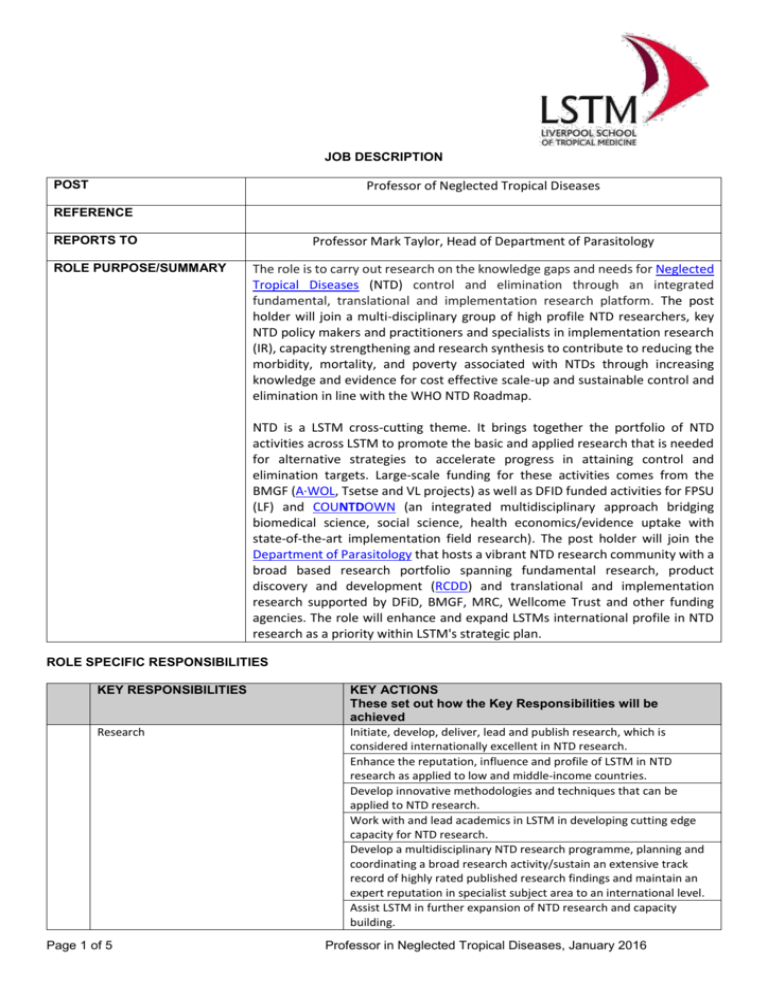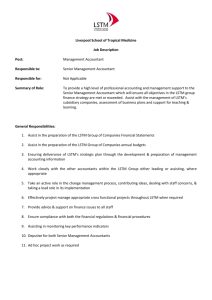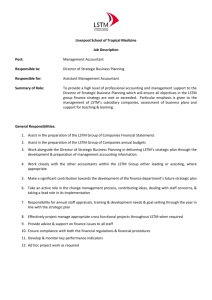JOB DESCRIPTION POST Professor of Neglected Tropical Diseases
advertisement

JOB DESCRIPTION POST Professor of Neglected Tropical Diseases REFERENCE REPORTS TO ROLE PURPOSE/SUMMARY Professor Mark Taylor, Head of Department of Parasitology The role is to carry out research on the knowledge gaps and needs for Neglected Tropical Diseases (NTD) control and elimination through an integrated fundamental, translational and implementation research platform. The post holder will join a multi-disciplinary group of high profile NTD researchers, key NTD policy makers and practitioners and specialists in implementation research (IR), capacity strengthening and research synthesis to contribute to reducing the morbidity, mortality, and poverty associated with NTDs through increasing knowledge and evidence for cost effective scale-up and sustainable control and elimination in line with the WHO NTD Roadmap. NTD is a LSTM cross-cutting theme. It brings together the portfolio of NTD activities across LSTM to promote the basic and applied research that is needed for alternative strategies to accelerate progress in attaining control and elimination targets. Large-scale funding for these activities comes from the BMGF (A·WOL, Tsetse and VL projects) as well as DFID funded activities for FPSU (LF) and COUNTDOWN (an integrated multidisciplinary approach bridging biomedical science, social science, health economics/evidence uptake with state-of-the-art implementation field research). The post holder will join the Department of Parasitology that hosts a vibrant NTD research community with a broad based research portfolio spanning fundamental research, product discovery and development (RCDD) and translational and implementation research supported by DFiD, BMGF, MRC, Wellcome Trust and other funding agencies. The role will enhance and expand LSTMs international profile in NTD research as a priority within LSTM's strategic plan. ROLE SPECIFIC RESPONSIBILITIES KEY RESPONSIBILITIES Research Page 1 of 5 KEY ACTIONS These set out how the Key Responsibilities will be achieved Initiate, develop, deliver, lead and publish research, which is considered internationally excellent in NTD research. Enhance the reputation, influence and profile of LSTM in NTD research as applied to low and middle-income countries. Develop innovative methodologies and techniques that can be applied to NTD research. Work with and lead academics in LSTM in developing cutting edge capacity for NTD research. Develop a multidisciplinary NTD research programme, planning and coordinating a broad research activity/sustain an extensive track record of highly rated published research findings and maintain an expert reputation in specialist subject area to an international level. Assist LSTM in further expansion of NTD research and capacity building. Professor in Neglected Tropical Diseases, January 2016 KEY RESPONSIBILITIES KEY ACTIONS These set out how the Key Responsibilities will be achieved Formulate, communicate and deliver a clear vision and strategy for the development of NTD research that is internationally excellent, supporting the sustainability of LSTM and its subsidiary companies. MANAGEMENT RESPONSIBILITIES KEY RESPONSIBILITIES KEY ACTIONS These set out how the Key Responsibilities will be achieved Influence high level internal and external collaborations and demonstrate a successful record of driving change. Articulate and deliver academic vision and leadership within individual area of expertise at international level. Take leadership role in policy dialogue at regional, national and global levels that help effect change based on reliable research led evidence. Lead, manage and mentor a team of senior academic and business support staff, overseeing delegated areas of responsibility. Manage staff and financial resources for programme activities, effectively allocating workloads across the team. Advise/mentor junior staff on the planning and development of their careers Participate in the overall management of LSTM by contributing to relevant Committees, either internally or externally, nationally or internationally. Make an effective contribution to the wider academic community, at a leadership level. Demonstrate an understanding of and influence upon global factors affecting the discipline and work of LSTM Provide leadership and guidance to other colleagues on aspects of research, teaching, learning and assessment, recognising the potential for inter-disciplinary and cross-disciplinary collaborations; playing a key role in such initiatives. Make a significant contribution to the wider organisation and professional reputation of LSTM. Contribute to the effective development and implementation of LSTM policy and strategy Leadership & Management FURTHER RESPONSIBILITIES KEY RESPONSIBILITIES Teaching and Learning Support External representation/ partnership working & income generation Page 2 of 5 KEY ACTIONS These set out how the Key Responsibilities will be achieved Take responsibility for the general teaching and learning strategy as applicable to own academic field. Collaboratively approve the quality standards of LSTM teaching programmes as applicable to own academic field Lead on innovative curriculum design as applicable to own academic field. Develop strategically important global partnerships and collaborations. Generate grant income/initiate opportunities for external funding, with a proven ability to attract significant high prestige funding. Professor in Neglected Tropical Diseases, January 2016 KEY RESPONSIBILITIES Continuing Professional Development Page 3 of 5 KEY ACTIONS These set out how the Key Responsibilities will be achieved Liaise at high level with external bodies and participate effectively in complex negotiations, including leading and developing external partnerships and collaborations. Proactively and professionally represent the work of LSTM nationally and internationally. Evidence of establishing a personal reputation at international level in respect of expertise, innovation and delivery of outcomes. Maintain a broad knowledge of up to date research and scholarship in relevant fields to help LSTM ensure that teaching and research meets the professional and innovative standards expected of a HEI of its specific nature Any other duties commensurate with the grade and nature of the role Professor in Neglected Tropical Diseases, January 2016 PERSON SPECIFICATION POST Professor of Neglected Tropical Diseases COMPETENCY CRITERIA ESSENTIAL/ DESIRABLE Qualifications, Training & Knowledge PHD or equivalent in a relevant subject area Professional qualification in Higher Education Teaching and Learning. Proven continuous professional development at appropriate level. Extensive knowledge of subject area informed by substantial current research in the field Demonstrable knowledge of the pedagogical and quality assurance principles underlying effective learning, teaching and assessment and their effective application in the widest sense Knowledge of strategic leadership principles and their effective application in a HEI setting Demonstrate an understanding of global factors affecting the discipline and work of LSTM Experience Evidence of established international reputation in academic field. Outstanding record of international level peer reviewed original publications and research, including in relation to low or middle income countries. Strong record of successfully generating significant/high prestige external funding (grants, contracts etc.) to support research projects. Proven record of research leadership in a HEI and experience of developing multidisciplinary research programmes (including stakeholders from academia, industry, MOH etc. for example). Experience of initiating, planning, organizing, implementing and delivering major programmes of work of strategic organizational-wide benefit. Considerable leadership and management experience, including the effective use of resources and budgetary responsibility and evidence of the capacity to assume further, major leadership roles within and outside LSTM. Experience of leading, motivating and collaborating within highly successful teams. Experience of academic governance and administration. Proven experience of effective curriculum development and making a significant contribution to teaching and learning strategy ASSESSMENT E D E E APPLICATION APPLICATION APPLICATION APPLICATION E INTERVIEW E INTERVIEW E INTERVIEW E E application and interview application and interview E application and interview E application and interview E application and interview E application and interview E application and interview E E application and interview application and interview E E application and interview application and interview Skills & Behaviours Demonstrable strong computer literacy skills Evidence of high-level numerical reasoning abilities. Page 4 of 5 Professor in Neglected Tropical Diseases, January 2016 COMPETENCY CRITERIA Excellent interpersonal skills with the ability to network and negotiate at international level and communicate effectively and confidently both orally and in writing to achieve desired results of strategic significance. Evidence of strong strategic leadership and management skills with the ability to inspire and motivate a wide range of staff and collaborators. Excellent time and resource management, planning and organizational skills. Demonstrable successful project management skills. Self-motivated with an ability to apply high levels of initiative, creativity and sound judgment, with a proactive approach to strategic problem resolution at organization- wide level Flexibility in approach and with regard to working arrangements; positively driving change for organization-wide benefit. Enthusiastic and entrepreneurial approach to work. Promotes equality and diversity in all aspects of role Role Models LSTMs values and required competencies at appropriate level Page 5 of 5 ESSENTIAL/ DESIRABLE E ASSESSMENT application and interview E application and interview E application and interview E E application and interview application and interview E application and interview E E E application and interview application and interview application and interview Professor in Neglected Tropical Diseases, January 2016









